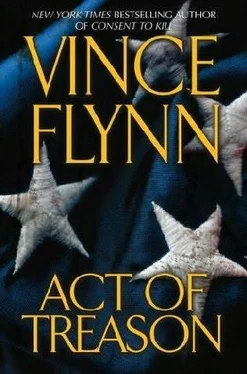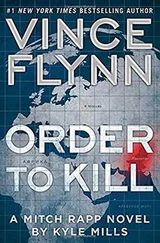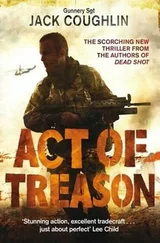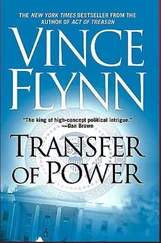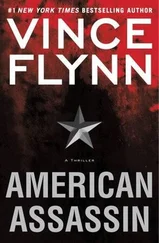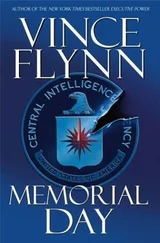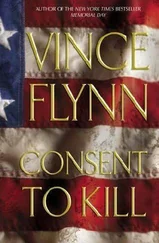Garret nodded in agreement. “Pretty well played, if I do say so myself.”
A former CIA employee was on screen laying into Director Kennedy for not keeping Mitch Rapp on a tighter leash. He claimed that he had been warning people for years that the man was out of control.
“Do you think there’s a chance he could go to jail?” Ross asked.
“Who knows? It’s typically against the law to kidnap people and shoot them.” Garret found his comment amusing and started laughing.
“We should probably think about coming out with a statement.”
“Not yet. Too early. Let everyone else do your dirty work. Maybe tomorrow or Friday you could release something. For now I’d just sit back and enjoy the implosion of Kennedy’s career.”
The advice sounded good to Ross. He wondered how Kennedy was taking the news. Morale out at Langley would not be good this morning. The thought of all the long faces gave Ross a delicious idea. He clapped his hands together loudly, and then rubbing them together, started for the bedroom.
“Where are you going?” Garret asked.
“To get dressed. I’ve got a busy morning and I need to squeeze in an unscheduled stop.”
LANGLEY, VIRGINIA
Kennedy was late for the senior staff meeting, which was very unlike her. Even more unusual was the fact that she’d slept in. She needed to catch up after a long, restless night. She had gone to bed watching Letterman and worrying about the possibility that this thing could go all the way to Josh Alexander. She fell asleep before the first guest, woke up some time around 3:00 in the morning, and then tossed and turned for two plus hours trying to figure out just how damaging the entire thing could be. If the second limousine was the target, and it was done to both eliminate a problem for the candidates and drum up sympathy, an election had not simply been stolen. It had been manipulated, which added another layer of concern to an already horrible problem.
Innocent lives had been taken, but Kennedy was being paid to worry about an even bigger picture. Chiefly, the safeguarding of the country and its institutions from foreign attack and subversion. What worried her the most was the possibility that the Belarusian mafia may have had a hand in the affair. Russia and Belarus were very close. The communication between their intelligence agencies was good. It didn’t always flow both ways, but in the end Mother Russia got what it wanted. The separation between their intelligence services and organized crime was at times nonexistent. If the Belarusian mafia helped plan the attack on the motorcade, it was an almost certainty that the KGB knew about it. With that type of information in their possession the KGB would be in a perfect position to subvert the next administration.
She’d fallen back asleep sometime around five and was woken up by her son at 8:15. He was late for school and she was late for work. Normally this would have created a panic, but when Kennedy took a look at the front page of theNew York Times, she decided she’d take her time. Langley would be rife with recrimination this morning. Longtime coworkers, some of them friends, would be weighing their options. Many of them would come to the conclusion that it was time to distance themselves from Kennedy. Her tardiness would only add to the rumors and unease, but that couldn’t be helped.
After dropping Tommy off at school, she unfolded her copy of theTimes and read the article while her driver brought her straight to Langley. She read it twice and both times she smiled. Rapp had been right about two things. The first was that Rich definitely thought he was going to win a Pulitzer for the story, and the second was that this was going to be fun.
When she stepped off the elevator just outside her office, her administrative assistants were both on the phone. Pink call messages as thick as a deck of playing cards were waiting for her. Sheila, with the overdone makeup and the red hair, gave her a look that saidHelp. Kennedy smiled, said good morning, and walked into her office. Three men were waiting for her at the far end of the room. They were seated at the conference table. Kennedy set her briefcase behind her desk, closed the office door, and then hung her black cashmere overcoat in her closet. She tugged on the sleeves of her white blouse and unbuttoned the jacket of her blue pinstriped pantsuit. She’d picked the outfit with the press conference in mind.
Sitting at the table were Deputy Director of Intelligence Charles Workman, Deputy Director of Operations Jose Juarez, and Deputy Director Roger Billings. All three men sat in silence with their hands resting on the polished wood surface of the long table. They were obviously waiting for her to speak first. Kennedy walked to the far end where a singed American flag was framed. It had been pulled from the rubble of the Word Trade Center.
Kennedy pulled a chair out and said, “Sorry for being late this morning.” She was about to sit when she noticed a copy of theTimes underneath her briefing folder. Kennedy slid her leather bound briefing book to the side and said, “May I get any of you something to drink before we get started?”
All three men declined by shaking their heads. Kennedy eased into her chair and set her reading glasses atop the leather briefing folder. “So what do you have for me this morning?”
Juarez was sitting on her left. The dark circles under his eyes were more pronounced this morning. She was sure Tom Rich had probably called him for a comment last night, and she was also certain he had said nothing. As for the two men on her right, Kennedy couldn’t be sure. They were good men, but they did not have the screw-you attitude of a Clandestine Service officer. Juarez had survived some very nasty stuff in the field. He would not be spooked by an investigation and the possibility of a new director. Workman and Billings, though, were desk jockeys. They’d spent the vast majority of their careers right here in Washington. They were ensconced in their nice suburban homes, Workman with three kids and Billings with four. The older ones were in college, which added financial pressure, and the younger ones were thinking about college, which added even more. They were both nearing fifty, and they were both in a position to succeed Kennedy if she got the boot. Which, from their vantage point this morning, looked like a certainty. Juarez, on the other hand, knew he would never get the top job. He was more spit than polish and had the irritating habit of speaking truth to power.
To become the director of the CIA you needed to be nominated by the president and confirmed by the Senate. There’d been many presidents in tune to the fact that they needed people like Juarez around to balance out all the ass kissers who were so enamored of the office. The Senate was a different story, though. Especially the older senators who’d been around for three terms or more. They had a sense of entitlement, and often perceived disagreement as a sign of disrespect. Juarez did not get along with these men, and he made no effort to disguise his dislike of them. Workman and Billings, on the other hand, worked very hard to curry favor from this crucial block of senators.
Billings was Kennedy’s number two. He’d grown up in Vermont and attended Dartmouth. He was as steady as they came, and he did not like change. A worrier, it showed in his wispy brown hair that he parted to the side from left to right.
Billings gave Kennedy an uneasy look and asked, “Have you read theTimes this morning?”
Kennedy looked at the newspaper in front of her, her name in large letters underneath the banner. It meant nothing to her. She’d gotten over seeing her name in print years ago. She hadn’t put a lot of thought into how she would handle this. She had a 10:30 meeting with the president, and until then she wanted to keep the information on Gazich as quiet as possible.
Читать дальше
